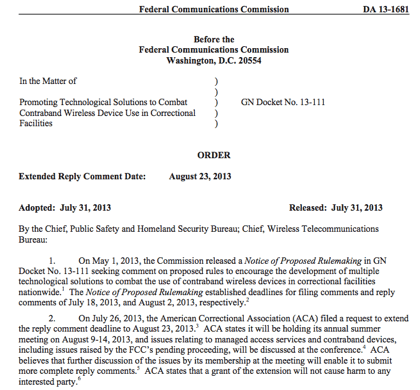Prison Cellphone Reply Comments Date Extended
02 08, 13 10:56 Filed in: prison cellphone use | Prison Jamming Issue | Prison jamming | cellphone unintended consequence

In the above order from FCC, the reply comment date for the cellphones in prison rulemaking, Docket 13-111, has been extended to August 23, 2013.
There is a lot to comment on:
- AT&T objects to requiring a carrier to terminate service to a cell phone identified being in a prison saying it will only do so with an order from FCC or a court. (Perhaps FCC could set up a website and “rubber stamp” all requests from approved prison administrators and then forward the request to AT&T?)
- Boeing states that FCC could authorize managed access in cellular spectrum “without a spectrum lease agreement” and that “reliance on lease agreements to authorize managed access systems could create undesirable precedent” (Most other commenters just believe FCC should simplify leasing and, except for MSS comments, do not suggest that leasing should be mandatory or should be on reasonable terms.)
- CTIA believes that mandatory service termination of cell phones operating in prisons can not be authorized unless FCC “adopt(s) clear, standardized requirements that apply to all cell detection systems” - a clear multiyear delay unless CTIA wants to be helpful -- as opposed to be obstructive.
- Verizon thinks service termination requests should require a court order. Heck, AT&T is more open minded and is willing to consider a request from FCC! (Sprint & T-Mo have not commented as yet.)
- NTCH, Inc. (a regional CMRS carrier that offers service under the trade name CLEAR TALK) says FCC “should declare the confines of prisons, including surrounding lands owned or controlled by the prison system, to be ‘quiet zones’ akin to the Commission's treatment of radio astronomy and other research facilities designated by the Commission…A corrections department could only declare a site a quiet zone in connection with its designation of one or more entities that would bear the expense and take the responsibility of preventing unauthorized transmissions in the prison confines and would also be in a position to offer service over authorized frequencies in the prison area…Once designated as the Prison Service Provider, the Provider would be authorized to prevent or create interference to any unauthorized transmissions from within the prison confines (including the buffer zone described below) because no such transmissions would be lawful under the terms of the licenses pursuant to which the offending cell phones would normally be operating…This plan relies on well-known quiet zone protection principles but extends not just to astronomical observations but to measures which directly protect human health and safety. The modest diminution in rights which the cellular carriers would experience under this plan is far outweighed by the benefits to the public which would result.”
- All the comments can be found at http://apps.fcc.gov/ecfs/proceeding/view?name=13-111.
vox populi, vox dei
blog comments powered by Disqus



![Validate my RSS feed [Valid RSS]](valid-rss-rogers.png)

